Everyday Heroes – Muses, Passion Projects, and Changing the Status Quo
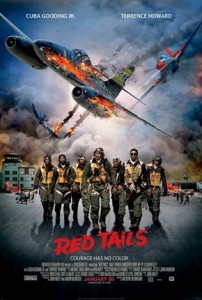 Last weekend I watched the telecast of George Lucas receiving the prestigious NAACP Vanguard Award for his body of work, including Red Tails. The movie chronicles the story of the famous Tuskeegee Airman, who faced racism and bigotry even as they laid down their lives for their country. It was a fitting award for a man who spent twenty years and $100 million of his own money to bringing this story to life on the big screen. Red Tails is just the latest project of Lucas’ passion to make a mark on the film industry, and hopefully it too will inspire change in the status quo.
Last weekend I watched the telecast of George Lucas receiving the prestigious NAACP Vanguard Award for his body of work, including Red Tails. The movie chronicles the story of the famous Tuskeegee Airman, who faced racism and bigotry even as they laid down their lives for their country. It was a fitting award for a man who spent twenty years and $100 million of his own money to bringing this story to life on the big screen. Red Tails is just the latest project of Lucas’ passion to make a mark on the film industry, and hopefully it too will inspire change in the status quo.
What’s the big deal? Why is this movie groundbreaking? If you’re a white straight man, maybe the status quo is just fine with you. For years, the movie studios, television networks, publishing houses, and comics book industry have held firm to the mindset that white + straight + male = The Formula. Anything deviating from that seems to give sweaty palms to the people charged with making the decisions about the who’s and what’s in storytelling. Lucas, though, wanted to make a movie about black characters, with a black director and black artists. The Hollywood studio execs’ palms didn’t just sweat; they were waving off the idea like a B-17 on fire. But instead of giving up on his passion, Lucas produced the movie himself.
I’m a huge fan of George Lucas’ work as a storyteller, businessman, and innovator, and I was excited to see Red Tails get its chance. In a little over a month, Red Tails has made over $48 million at the domestic box office, and the jury is still out on the matter of its box office success. Another movie that deviates from The Formula, The Hunger Games, is poised for a huge box-office tally beginning with midnight openings on March 23. It seems as the months go by, Hollywood’s predetermined mold is continuously being challenged. What movie and television studios, as well as publishing houses, are slowly beginning to grasp (or getting beaten over the head with) is that Good Storytelling + Relatability + Engagement + Movie Magic = The Formula. Based on the propensity to go back to the well with Superman, Batman, Spiderman, and any number of other male-centric remakes, I’m not sure the suits with the money are quite ready to take the big leap. But in the near future, many things are possible.
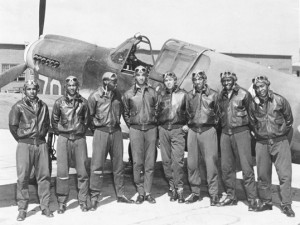
When Lucas appeared on the Daily Show with Jon Stewart to talk about Red Tails, he explained that he had wanted to make a heroic tale for “young men.” Considering that the original Star Wars trilogy had inspired me as a young woman – it included Good Storytelling + Relatability (Princess Leia for me, Han and Luke captured the imaginations of others) + Engagement (mind-blowing special effects and heroes to root for, among other things) + Lucas’ own brand of Movie Magic – I initially reacted with disappointment to that statement. When I considered his words later, though, I came to the conclusion that he hadn’t meant to discount young women, but rather that he was advocating specifically for young men – and really young black men in particular, who honestly can’t point to a lot of faces like theirs among the heroic role models in contemporary American fictional entertainment. Personally, I would never want someone to assume offense from me just because I advocated positively on behalf of women, female characters, or other issues important to me – although, unfortunately, I can give quite a few examples of that exact thing happening – and I realized I owed Lucas the same courtesy for his remark.
On reflection, I also realized that my initial reaction to Lucas’ statement on the Daily Show came from a place of wariness that is based in my own life experiences. Everyone has witnessed someone jump to a knee-jerk reaction based on an assumption grounded in insecurity or lack of understanding. Many times in life a woman or a minority person will face biases; these incidents in turn can create biases in the person experiencing them. It’s important not to become part of the cycle. Conversely, it’s also important to be sympathetic of people who have experienced bias. Neither is easy. As I watched the NAACP tribute montage roll, it was interesting to be reminded of the diversity in Star Wars and notice that even Jar Jar – a character that has sparked racial controversy – was included. Interestingly enough, when speaking after receiving his honor, Lucas said he made this movie to inspire “young people,” and I wondered if a similar kind of reflection led Lucas to use a slightly different wording than he had on the Daily Show.
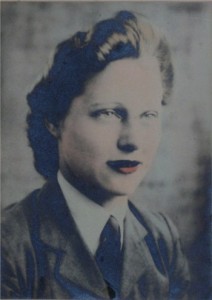
Also in his acceptance speech, Lucas gave credit for his passionate pursuit of Red Tails to the Tuskegee Airman, with whom he had been consulting over the last two decades. In a sense, those men served as his muse. Lucas specifically remarked that this movie was a story about “heroes” as opposed to “victims.” In my mind, there is no better way to demark the difference between the two than by showing men who would lay down their lives for a country that legally decreed that they were not equal citizens. As the former fighter pilots stood in their uniforms and were honored with applause, it was a very real reminder that those heroes had truly refused to be victimized.
As we look back on our nation’s history, we should acknowledge that unfortunately it took the demands and sacrifices of a world war to jump-start the progress toward racial equality. While dogfights and bombing runs are spectacular and impactful in a movie, it’s important to remember that men and women had to die, and that it was an overwhelming fear of losing the war that spurred change in how blacks were allowed to fight (and die). I may have been born a quarter century after the war, but my generation was certainly shaped by it.
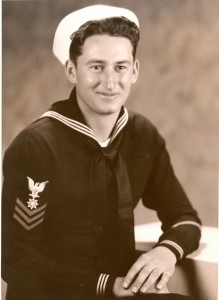
Of all the brave deeds performed by the Tuskeegee Airmen, perhaps it’s what they did beyond the war that has made a bigger difference in the lives of Americans than the hundreds of bomber jocks they saved. Think of all the children they came home to – children still living in a society that thought of them as unequal, and hearing tales of their father’s or uncle’s or neighbor’s heroism. How do I know that made a difference? Because the actions of my grandparents during World War II very much shaped how I perceived myself, the world, and how I should confront injustice. When I was a little girl, I heard stories of my mother’s father, who we called Boppo, navigating a minesweeper across the Pacific and of my father’s mother, Grandma Joe, maneuvering barrage balloons to protect an airfield in Great Britain. For much of my early life, I believed men and women both served in the military, fought the bad guys as warriors, and defended our country and freedom.
It wasn’t until early in high school that I was confronted with the reality that some people didn’t believe I should have the same opportunities as men. The first instance I can specifically remember was being told by a math teacher that no girl would ever get an A in his class; we just weren’t meant to learn like boys, he said. I remember being torn between a rage-against-the-machine response (much like Joe in Red Tails) and finding a way to simply prove his bigotry wrong (like Marty). The path I chose was to work harder than I ever had at math, and I earned the second highest grade in that class. Suddenly, at semester’s end, the math teacher was faced with a choice – just like the generals depicted in Red Tails – either give me an A, or punish a bunch of boys with B’s they didn’t deserve and face explaining why his bell curve of grades didn’t work out. (As you might expect, he flinched in the face of that fear and gave me the A grade I’d earned, too.) That certainly wasn’t the last time I’ve experienced a limiting mindset from people, one that says I can’t do something simply because of my gender. Later in high school other obstacles popped up – I wanted to be a fighter pilot, but it wasn’t allowed; I considered going to West Point or the Naval Academy, then I realized I had a quarter of the career choices inside the military as I did outside.
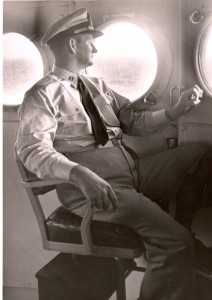
In the end I found another way to contribute. I spent four years interning during summers and holidays for the Air Force in the Pentagon, and two years working part-time in the Army ROTC office while I was in college. Since that time many more doors have opened in the military, but it’s by no means an even playing field for women yet. (This website has a great list of women who made the push for equality in the military their passion projects.)
While it’s important that some people choose to challenge the system directly, sometimes just making the most of the opportunities given can make a difference, as well. I can’t thank my grandparents enough for giving me the inspiration to face those challenges. In the end, it was their examples that reminded me that the only person that can let you believe you’re not worthy is yourself. Let me see if I can explain why…
Boppo joined the Navy at the age of twenty-three. With no college education, he rose through the ranks as an enlistedman, became a warrant officer, and finally a commissioned officer. When he was asked to interview for the position of captain of the Presidential Yacht, he never thought himself less worthy than the other sailors with Naval Academy pedigrees. Ultimately, he was handpicked by President Kennedy for the job. After thirty years in the Navy, his résumé short on formal education and heavy with on-the-job training, Boppo left the Navy to manage a major law firm. While I have pages of notes on my grandfather’s bravery in the Pacific, his most remarkable traits are these: the mindset that hard work can take you anywhere, and his life proved that true love really does exist. The amazing tale of his wartime courtship with my grandmother – less than a couple weeks from their first meeting until their wedding – and their six decade love affair is actually worthy of its own epic movie.
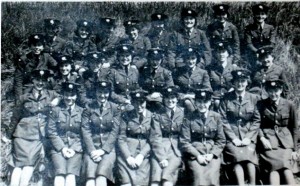
After losing her first husband in the waning days of 1941, Grandma Joe joined the Women’s Auxiliary Air Force, part of the famed Royal Air Force. She dragged helium-filled balloons behind a truck in order to force enemy pilots to fly higher, reducing their ability to hit their bombing targets. It was dangerous work, and by all accounts she had quite a few movie-worthy adventures along the way. After being discharged for pregnancy, Grandma Joe traveled with her new husband to Australia and eventually the United States. Literally a mid-twentieth-century pioneer braving new worlds and a new life, her five children have all gone on to contribute in their own amazing ways to the country she finally called home. Always larger than life in my eyes, even as she faced cancer in her sixties, my grandmother confronted the disease that would take her life head on and with a brave smile. Grandma Joe taught me by example that I needed to tackle life’s challenges as they came – and laugh a little at them if I could.
Much like George Lucas, I have found inspiration in the unlikely heroes of World War II. At times Boppo and Grandma Joe have served as my own muses, too; I’ve written about wartime romances, long-lasting loves, men who make the most of what they’re given in life, women who fight just as hard as the men, and heroes who laugh in the face of death. It’s amazing that the bravery of the Tuskeegee Airman has the power to keep opening doors even today, and that someday, hopefully, because of Red Tails, other directors, writers, artists, and actors will have greater opportunities to tell more amazing stories about heroes refusing to become victims.
Author’s Note: This blog post was far along in research and outlining when EUCantina posted an opinion piece on fansite reaction to the movie Red Tails. I respectfully disagree with the opinion expressed by Chris, and hope this post sheds some light on the reasons why I see the movie, and Lucas’ efforts, as groundbreaking. To me, the best part of being a fan (of anything) is the passion it stirs inside. If we can take nothing else away from Red Tails, it’s that we should remember to respect each individual despite our differences.
A graduate of Duke University, Tricia is a registered Professional Engineer who designs transportation systems as a consultant. In her free time, she shows horses and maintains a website for Star Wars EU fans that creates a safe place for women and men to discuss literature and all things pertaining to geek culture. She is currently writing her first full-length original novel, a space opera based around the heroic journey of a young woman who finds herself in the middle of a deadly terrorist attack by an invading alien force. For information on the book, please check out TriciaBarr.com.
- Hyperspace Theories: SKELETON CREW Ahoy! - December 29, 2024
- Hyperspace Theories: WICKED Part I Rises to the Moment - December 6, 2024
- Columbia’s Vader™ Collection Launches Dec 5 - November 27, 2024








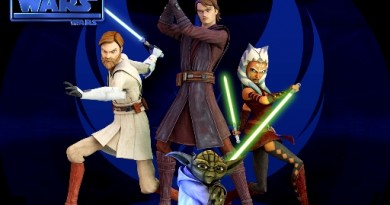
That was a really lovely article, Tricia. Seriously. :)